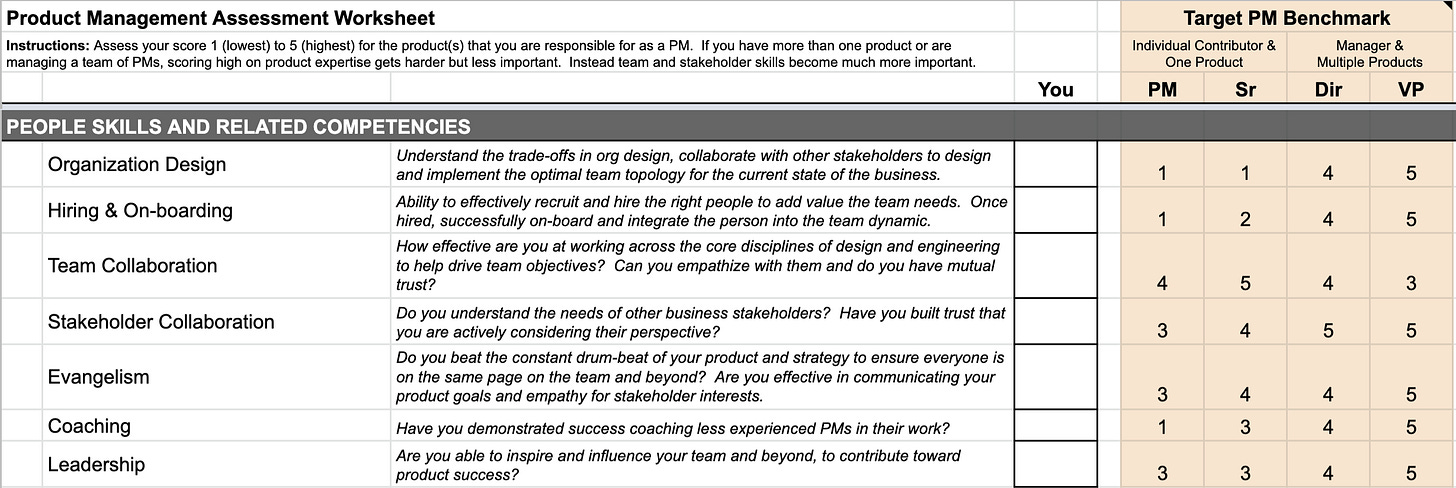PF#56: Product Manager Assessment
Product Manager scorecard to be used with your Product Coach, Manager, or for your own self-assessment.
This is my first new article back on Substack after a brief adventure into using ConvertKit and Wordpress. If this is your first article in a while it is because my emails weren’t getting through and I hope coming home to Substack solves that. I will shortly be migrating all of those (since Oct 2020) back here for one stop shopping.
Enough about my adventure and on to the article. If you find value in this please let me know in the comments and share with your product people.
Product Manager Assessment
Over the course of my career, I have had to develop some assessment of competency for Product Managers and Product Marketers on multiple occasions. Usually I have broken this into three major buckets of competency: Domain, Practices, and Soft Skills.
I have done this for the benefit of assessing and developing large organizations. I have also done this for my own self-assessment and that of product managers I have had the benefit of coaching.
Marty Cagan and Chris Jones recent book Empowered catalyzed me to rethink my assessment a bit. I have shifted the major categories, replaced soft skills with “people skills & related competencies” and setup a new template that can be useful no matter if you are a novice PM or a VP in charge of a portfolio of products.
If you like what they described in Empowered, you could now take this as a practical tool for implementing a self assessment or a coaching program.
Quick Overview and How to Use
The PM Assessment is quite simple for all you smart people out there. Each row represents a high level competency for assessment. I have a short name and then some description to explain what you should be assessed for on that topic.
To the right is a “You” column for entering how you assess yourself on a scale of 1-5. A “1” represents a beginner with little to no experience. A “5” reflects you having obtained, what could be described objectively, as expert status.
The four columns to the far right are benchmarks to measure yourself against. It is important to recognize that once you have achieved a score, then get promoted or switch product area responsibilities, that score can reset to a lower score.
You don’t become a “5” then have that on any new job. In your new job, whether it is in the same company or a new one, you will need to reassess where you are to start rebuilding specific competencies - especially in the category of Product Expertise.
Even your Practices & Skills may not be wholly transferrable. You must reassess to determine where you have gaps worth focusing energy to close.
Finally, the benchmark scores I provide are quit intentional but they are not universal to all situations. Consider, if you are the first PM hire at a company or if you are one of 50 PMs in a deep career ladder. So adjust the benchmarks to fit your unique situation. If you need assistance, I am happy to discuss.
Product Expertise
Product Expertise is how you develop insights to derive the right product strategy. In some markets you may have deep domain experts supporting your work, while in others nobody in the company came from working in that domain themselves.
Continuously researching and understanding what gaps the organization has in its expertise will help you prioritize the information to go after.
To effectively collaborate and understand the business drivers in your organization, you must learn the key players and their function well enough to work with them. As you move up in seniority it is a given that you take the broader business perspective. As a more junior PM, gaining this understanding will help you accelerate support for your plans.
All of these data points are important but, in particular, if you are new to a product area, it is really important to learn as much as you can about your customers, users, and product definition. This is where I would start, as even the most junior PM should become a leading expert here.
Practices and Skills
The most transferrable competencies are those of being an experienced practitioner of product management. How do you perform Product Discovery and Why? How do you prioritize work and plan a roadmap?
While the tools and standards of practice vary between different organizations, these are mostly cumulative throughout your career. Just keep adding arrows to your quiver by continuing seeking out better ways to practice your craft.
At the rate of change today, if you are a 5 and stop learning, you will be a 3 before too long. This is the peril of Dir/VPs that run large organizations who get lost a long the way because they are not as hands on.
People Skills and Other Competencies
I used to focus a lot on soft skills like being curious, analytical, and an effective communicator. Now, my thinking is that in order to attain a high degree of success at any of these areas, you must indirectly possess those soft skills.
Rather than focusing on those soft skills then, I focus on practical application of those soft skills such as Hiring, Collaboration, and Coaching.
Conclusion
That’s the whole Product Manager Assessment. I hope you can make some good use of it and would love feedback on ways to improve it. In my experience, these tools are never perfect but they can help steer you through structured thinking.
Lastly, if you are interested in coaching and don’t have that support within your organization today, please reach out to me. We assess where you are, then set goals for improvement and work together to achieve them.






